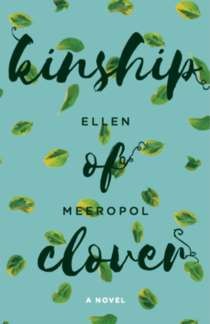
My mother, Ellen Meeropol, calls herself "a literary late bloomer.” After careers in art and medicine, she started seriously writing fiction eighteen years ago when she was well into her 50s, and has had three novels published in the past six years. Her books explore themes that are likely familiar to many Rosenberg Fund for Children grantees and supporters. As her website notes:
[Ellen’s] writing continues to draw from her twin passions of medicine and social justice activism, exploring characters at the intersection of political turmoil, ethical dilemmas, and family life. She strives to follow poet Martín Espada’s advice that, "Any oppressive social condition, before it can be changed, must be named and condemned in words that persuade by stirring the emotions, awakening the senses."
My mom’s latest novel, Kinship of Clover, explores the difficult choices that divide and connect families and communities. The novel centers on Jeremy's visions of extinct plants, which bring him both pain and comfort as he deals with the lasting repercussions of a trauma from his childhood and tries to find his way as a young adult and budding environmentalist. While Jeremy is contemplating his first steps as a tentative activist, rabble-rouser Flo is wrestling with the impact of a painful secret she's kept for years in the midst of the deepening fog of advancing Alzheimer’s. Meanwhile, Flo’s teenage granddaughter, Zoe, searches for independence as she navigates falling in love for the first time. Readers of my mom’s earlier novels will also welcome appearances by other familiar characters from House Arrest and On Hurricane Island.
What I found most intriguing about Kinship of Clover was the way it addressed questions I’ve heard from a number of our beneficiaries over the years: how do parents’ political or activist choices impact how their children see the world? Does being the child of someone who faced repression for their political choices make you more or less likely to make similar choices yourself? Can you be angry at a parent for the impact of their actions while also proud of their commitment? How do you build lasting relationships with friends or family despite significant political disagreements? Are small acts of resistance enough in the face of serious repression or cataclysmic threats?
Perhaps it’s not surprising that this novel made me think of our RFC beneficiary families. In many ways, Kinship is a continuation of the stories my mom told as the author—with RFC Founder Robert Meeropol and former Board Member Martin Espada—of the RFC’s signature program, Celebrate the Children of Resistance. After years of communicating with our grantee families, I felt like this novel could be the story of an RFC beneficiary. I wanted to invite Jeremy to attend the upcoming Carry It Forward Gathering and support him and his family as they navigate the aftermath of targeting and repression.
Clearly, Kinship of Clover stirred my emotions; let me know if it did the same to you.
Ellen Meeropol has several upcoming readings in the greater NYC area: on June 6 in Manhattan, June 7th in Montclair and June 8th in Brooklyn. She'll be reading from Kinship of Clover in Chicago on June 14th and in Ann Arbor on June 17th.
